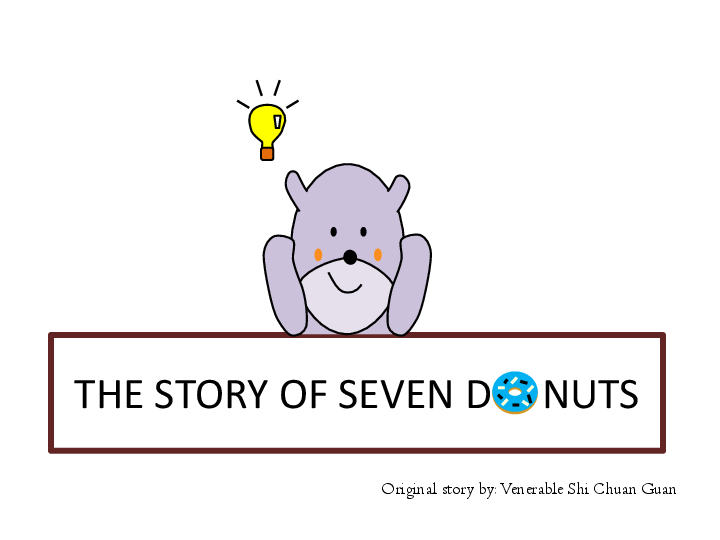
Tag: Mindfulness
You Have A Choice

In our life, we have a choice. Are we going to go through 9 hours of work grumpily or cheerfully?
Are we going to study for 3 to 4 years of undergrad studies just to earn a degree that we use only once for our first job, or are we going to actually learn something useful about this world, ourselves and others?
Are we going to stay faithful and committed to what we started with, be it a
project or a relationship? Are you going to get frustrated over things in life or are we going to choose to be happy?
It is easy to be happy when we get what we want. That is the first skill we all have. It is easy to be unhappy when we don’t get what we want. That is the second skill we all also have. But we have a third skill. We can choose to be at ease, or not to be unhappy when we don’t get what we want.
I say this not because I have mastered the third skill, but because I’ve tasted it and I know you can too.
So what is your choice my friend, are you going to watch this video?
Credits
Picture from http://www.louisalloro.com/blog/?p=960
Buddhism & Science Symposium IV ~ Growing a Beautiful Mind 29JUL2012@KMSPKS
Buddhism & Science Symposium is a series of public forums initiated by the Buddhist community in Singapore. The symposiums explore the relationship between Buddhism, Science and contemporary society.
How do we grow a beautiful mind from birth all the way into our golden years?
Join a former NASA Scientist, a Buddhist Monk from Bhutan, an Abbot from Singapore and a neuroscientist with Duke-NUS as they inquire into the issues of education and growing a beautiful mind.
http://kmspks.org/events/featured/buddhism-science-symposium
A Sharing on Death
Below is a sharing to a fellow Buddhist on having thoughts of death. Thought this may be useful to others.
Hi ___ , thanks for sharing your thoughts. Having such thoughts flash in our mind is not as uncommon as we may think. It is just that most people do not necessarily share
it or think that it is not auspicious. But I think otherwise.
Think about it this way. When we sit in a car, we wear the seat belt. When we board the plane, there is the safety video or demonstration before the plane take off. All these are reminders of death isn’t it?
Being reminded of death can prepare us to take positive steps towards preventing accidents that can be avoided. But knowing the risks itself gets us prepared so that when it does happen, we are not taken off guard.
Insurance policies and financial planning is about planning for the unexpected, one of which is death. While nobody wishes death to come when they are in their youth and enjoying their life, being prepared is good. That way, while we live our life positively and wholesomely, we know that should the inevitable strike, we’ve got ourselves mentally prepared.
When is it unhealthy to have thoughts of death? In my opinion, when our thoughts of death preoccupies our whole life that we live our life only to die or when our preoccupation with death actually hastens and lead to death. This would be an unhealthy preoccupation with death.
Appreciating that death is part of life, we learn not to cling unto life and have the wishful thinking that death do not come or at least not when we do not want it to. Instead, knowing that life is impermanent, we should cherish our life more and live it meaningfully, to its fullest potential so that we may benefit ourselves and others while learning to not be attached to each moment for we cannot hold onto any moment even if we want to.
Live our life to the fullest, for each moment is unique and is gone the moment you think about it!
With blessings,
Korean Doctor Uses Meditation as Therapy
What has meditation done for you recently?
People around the world are finding peace and calmness amidst the stressful modern society through the ancient practice of meditation found in Buddhism.
http://mingkok.buddhistdoor.com/en/news/d/24454
Dr. Jung Soon Young of Koyang Physiatrics Hospital received his phD degree at the Seoul Buddhist Graduate Program through his research paper on Korean Buddhist meditation program for Schizophrenia.
Dr. Jung uses the three steps; preparation, concentration, and mindfulness meditation, to make the patients be aware of their bodies. Dr. Jung re-developed Korean seon and mandala meditation, yoga and started this new program from November 2010.
After eight runs of this meditation program, the results proved to be positive.
In Dr. Jung’s research, the symptoms of depression in the control group was much higher than the group that received Dr. Jung’s Korean meditation treatment. His re-search showed that Buddhist meditation was largely helpful in improving individual’s lifestyle.
The nature of Buddhist meditation does not impose nor require any belief systems beyond the effort to observe one's own body and mind, making it suitable for everyone including theists and atheists alike.
Visit the nearest Buddhist temple and enquire about meditation. Request that they start classes and programmes if they do not have one already.
Perception ~ Coloured by the External Environment and Our Inner Preconception, Can We Truly See This World?
In an experiment conducted by Washington Post [1] back in 2007, they explore questions such as
“Do you stop and listen? Do you hurry past with a blend of guilt and irritation, aware of your cupidity but annoyed by the unbidden demand on your time and your wallet? Do you throw in a buck, just to be polite? Does your decision change if he’s really bad? What if he’s really good? Do you have time for beauty? Shouldn’t you? What’s the moral mathematics of the moment? ”
Will one of the U.S.’s greatest violinists be noticed in a D.C. Metro stop during rush hour? Joshua Bell [2] experimented for Gene Weingarten’s story in The Washington Post: http://wpo.st/-vP (Video by John W. Poole)
Video after the break.
Do we truly see things as they are? How coloured are we by the external environment and our inner preconception?
Do we see the goodness in our friends or do we judge influenced by the above factors?
When we study in school, do we learn the most from the teacher regardless of the environment and our perception of him? Or do we blame it on the teacher when we fail?
At work, who do we consider our friends? Are there enemies or as they say, in business and politics, there is only common interest? Do we allow ourselves to see the world with tainted glasses or do we peer through the colourings and see how things truly are?
Being influenced by our perception, we may respond or act differently, affecting how we interact with them and the environment.
Take our studies as an example, the following table models what can possibly be our “subject absorption” rate [3].
|
Subject Absorption Rate T x S |
Teacher (subject + teaching skill) T% |
|||
|
30% |
60% |
90% |
||
|
Student (attention + mindfulness + interest ) S% |
30% |
9% C1 |
18% |
27% |
|
60% |
18% |
36% |
54% |
|
|
90% |
27% |
54% |
81% C9 |
|
How well our teacher knows the subject and can teach is something we cannot quite change while we are in the classroom or lecture theatre. We can choose how attentive and mindfully we listen and how much interest we give it.
A simplistic 30%, 60% and 90% is presented for both teacher and student. Assuming a loss-less
knowledge transmission, each of the nine squares above shows the outcome from a simple Teacher-Student matrix.
The cell C1 shows the worse case scenario of 9% subject absorption while the cell C9 shows a win-win high 81% subject absorption!
Of interest is the last row, where the student maximizes his learning regardless of the teacher, and the first row, where the best teacher cannot help the student who does not give his best in class.
Missing from the table is a student’s own flair for the subject. That cannot change on the spot in class, and hence is not shown in the table. While it does affect the outcome, it has more or less a uniform impact across the nine scenarios above.
The ‘payout’ is that regardless of the teacher’s subject and teaching ability, the student who gives 30%, has to consistently put in much more effort after class to catch up while the student with higher attention, mindfulness and interest need to put in lesser effort after class.
How about the way we perceive people around us? Do we choose the best case scenario or set ourselves up for the worse case?
How about the video above? Without a stage, is the violinist any lesser?
Do we listen to advices because of the environment, or the speaker, or the message itself?
If the words of wisdom from the various renowned teachers are shared with you by a perfect stranger, an unknown clergy, priest or Buddhist monastic, would you learn and benefit as much from it?
If we meet the Buddha today, will we learn something from him?
When the student is ready, even the rustle of the leaves teach the Dharma!
References
[1] Washington Post article “Pearls Before Breakfast – Can one of the nation’s great musicians cut through the fog of a D.C. rush hour? Let’s find out.”
[2] Joshua David Bell (born December 9, 1967) is an American Grammy Award-winning violinist.
[3] This table was formulated by myself after my second year academic meltdown. I stopped blaming my lecturer for my failure, picked myself up and moved on to complete my degree in Computer Engineering, working in R&D and consulting before doning the robes!

